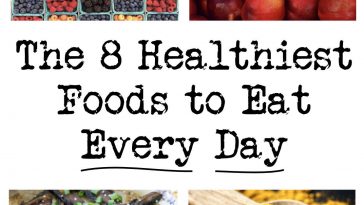"Most Healthiest" Food Myth: Debunked! Build Your Own Plate for Balanced Plate for Optimal Health
Beyond the "Most Healthiest": Why a Balanced Diet is Your True Nutritional Powerhouse
While the quest for the ultimate "superfood" might seem intuitive, the reality is far more nuanced. Instead of fixating on a single "most healthiest" food, we should focus on building a balanced and diverse diet. This article delves into the reasons why this singular focus is misguided and explores various food categories that offer a wealth of health benefits when incorporated into a balanced dietary approach.
Why a Single "Most Healthiest" Food Doesn't Exist:
- Dietary Needs are Individual: Each person has unique needs based on age, activity level, health conditions, and personal preferences. What might be incredibly beneficial for one individual might not be optimal for another.
- Synergy of Nutrients: No single food holds the key to unlocking optimal health. A balanced diet provides a symphony of essential vitamins, minerals, fiber, healthy fats, and protein, all working together to support various bodily functions.
- Oversimplification of Complex Issues: Attributing singular benefits to one food can lead to oversimplification of complex issues related to health and nutrition. Factors like portion size, overall dietary patterns, and individual health conditions all play a crucial role.
- Potential for Nutritional Imbalances: Focusing solely on one food could lead to neglecting other essential food groups, potentially creating nutritional imbalances. This can deprive the body of vital nutrients and have negative health consequences.
Food Groups for a Balanced Plate:
Instead of searching for a single champion, consider incorporating these diverse food groups into your diet for optimal health:
1. Fruits and Vegetables:
- Low in calories and fat: Perfect for maintaining a healthy weight.
- Rich in vitamins, minerals, and fiber: Crucial for various bodily functions like immune system support, digestion, and disease prevention.
- Aim for variety: Choose a rainbow of colors to ensure a diverse range of nutrients like vitamin A, C, and K, as well as essential minerals like potassium and magnesium.
2. Whole Grains:
- Higher in fiber, vitamins, and minerals compared to refined grains: Promotes satiety, keeping you feeling full for longer.
- Potential health benefits: May reduce the risk of heart disease, type 2 diabetes, and certain cancers.
- Examples: Brown rice, quinoa, oats, and whole-wheat bread.
3. Legumes:
- Excellent source of protein, fiber, folate, and iron: Essential for building and repairing tissues, supporting digestion, and maintaining healthy blood cell production.
- Affordable and versatile: Can be enjoyed in various ways, from soups and stews to salads and dips.
- Examples: Beans, lentils, peas, and chickpeas.
4. Nuts and Seeds:
- Packed with healthy fats, protein, fiber, vitamins, and minerals: Provides essential nutrients for brain health, heart health, and digestion.
- Enjoy them in moderation: While beneficial, they are also calorie-dense, so portion control is key.
- Examples: Almonds, walnuts, chia seeds, and flaxseeds.
5. Fatty Fish:
- Rich in heart-healthy omega-3 fatty acids: Essential for brain and heart health, reducing inflammation, and maintaining healthy vision.
- Good source of protein and vitamin D: Supports muscle growth and repair, and promotes bone health.
- Examples: Salmon, tuna, sardines, and mackerel.
Building a Balanced Plate:
- Fill half your plate with fruits and vegetables: Aim for a variety of colors and types.
- Choose whole grains over refined grains: Opt for brown rice, quinoa, or whole-wheat bread instead of white rice or white bread.
- Include lean protein sources: Opt for fish, poultry, beans, or lentils.
- Incorporate healthy fats: Include nuts, seeds, and avocado in moderation.
- Limit added sugars, unhealthy fats, and processed foods: These contribute to empty calories and can negatively impact health.
Remember:
- Consult a registered dietitian or healthcare professional: They can personalize dietary advice based on your individual needs and health goals.
- Focus on building a balanced and sustainable dietary pattern: Variety is key to ensuring you receive the full spectrum of nutrients your body needs to thrive.
- Enjoy your food! A healthy diet should be one that you can maintain long-term and find enjoyable.
By focusing on building a balanced and diverse dietary pattern rich in various food groups, you can ensure your body receives the essential nutrients it needs to function optimally and promote overall health and well-being. Remember, there's no single "most healthiest" food, but rather a symphony of nutritious foods working together to support your health journey.
Benefits of a Balanced Diet:
Building a balanced diet that incorporates various food groups offers a multitude of benefits for your overall health and well-being. Here are some key advantages:
1. Improved physical health:
- Supports healthy weight management: By providing essential nutrients and promoting satiety, a balanced diet can help you maintain a healthy weight and reduce the risk of obesity-related health problems.
- Reduces chronic disease risk: A balanced diet rich in fruits, vegetables, whole grains, and healthy fats may help lower the risk of developing chronic diseases like heart disease, type 2 diabetes, and certain cancers.
- Boosts energy levels: Consuming a variety of nutrient-rich foods provides your body with the fuel it needs to function optimally and maintain sustained energy levels throughout the day.
- Strengthens the immune system: A balanced diet rich in essential vitamins and minerals like vitamin C, zinc, and iron supports a healthy immune system, making your body more resilient to fighting off infections and illnesses.
- Promotes gut health: A diet rich in fiber from fruits, vegetables, and whole grains nourishes gut bacteria, which play a crucial role in digestion, nutrient absorption, and overall gut health.
2. Enhanced cognitive function:
- Supports brain development and function: A balanced diet including healthy fats like omega-3s and essential vitamins and minerals like B vitamins and choline is crucial for optimal brain function, memory, and cognitive performance.
- Improves mood and mental well-being: Certain foods like fruits, vegetables, and whole grains are linked to improved mood and reduced symptoms of anxiety and depression.
3. Increased energy and vitality:
- Provides sustained energy: By incorporating complex carbohydrates, healthy fats, and protein, a balanced diet helps regulate blood sugar levels, preventing energy crashes and promoting sustained energy throughout the day.
- Enhances physical performance: Athletes and individuals with active lifestyles benefit from a balanced diet that provides essential nutrients for muscle growth, repair, and recovery.
4. Overall well-being:
- Promotes healthy sleep: A balanced diet can contribute to better sleep quality by influencing hormone regulation and supporting relaxation.
- Improves skin health: Consuming adequate nutrients like vitamins A, C, and E, and staying hydrated can help promote healthy, radiant skin.
- Boosts self-esteem and confidence: Making healthy dietary choices and seeing positive changes in your health can contribute to improved self-esteem and body image.
Remember, a balanced diet is not just about individual foods but about creating a sustainable and enjoyable eating pattern that nourishes your body and mind, setting you on the path towards optimal health and well-being.
In conclusion
The quest for a single "most healthiest" food is a misdirected pursuit. A balanced and diverse diet, incorporating various food groups like fruits, vegetables, whole grains, legumes, nuts, seeds, and healthy fats, is the key to unlocking optimal health and well-being. This approach ensures you receive the full spectrum of essential nutrients your body needs to function optimally, reduce your risk of chronic diseases, and experience a multitude of benefits ranging from improved physical and cognitive function to enhanced energy levels and overall well-being. Remember, it's not about finding a magical "superfood" but about building a sustainable and enjoyable dietary pattern that nourishes your body and allows you to thrive.
Writer
Devraj Gorai


























